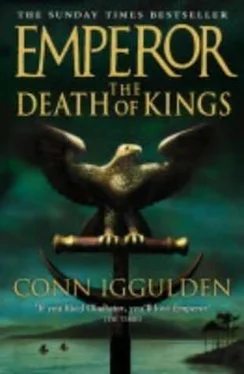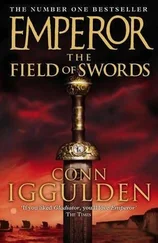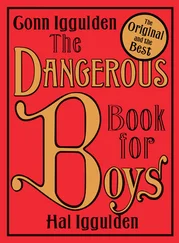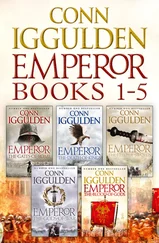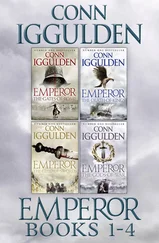Antonidus made a silent promise to slip away before the end came. He would not be paraded in Rome as a trophy. He could not bear the thought of a triumphant Cato condemning him with a wave of his fat hands.
***
“The men are exhausted,” Crassus snapped. “You must sound the disengage before they're overwhelmed.”
“No. They will hold,” Pompey said, squinting against the descending sun. “Send the extraordinarii to ready the camps for the night. We'll pull back when the light goes, but if I order it now, the slaves will think they have broken the only legions between here and Rome. Our men must hold. ”
Crassus twisted his hands together in an agony of indecision. The legions were under his command, and if Pompey waited too long to call them back, it could end everything they had ever worked for. If the legions fell, Rome would follow.
***
Julius heaved air into leaden lungs as he waited for the horns to sound the next attack. The blood on him had dried long ago and dropped away in dark crusts as he moved. Old blood. He looked wearily at his arms and held one hand up, narrowing his eyes at the shiver of exhaustion he saw there.
Another man panted at his side and Julius glanced at him. He had fought well in the last attack, spending his strength with the confidence of the immortal young. He looked up to see Julius watching him, and a shadow passed over his gray eyes. There were no words to be said. Julius wondered if Cato's son would survive the battle. If he lived, Cato would never understand the changes in him.
Ciro hawked and spat behind him to clear the blood from his throat. His lips were split and swollen and his smile was red when he grinned painfully at his general.
They were all cut and battered. Julius winced with every movement. Something had torn in his lower back as he'd heaved a dead man off him. It sent sparks of pain up to his shoulders with every movement, and all he wanted to do was sleep. He looked over at Brutus, who'd been knocked unconscious by a berserk slave. Only a swift countercharge had reclaimed the ground and his body. Ciro had dragged him back through the ranks to recover, and as the sky began to darken he'd rejoined them, but he moved more slowly and his skill had almost deserted him. Julius wondered if his skull had been cracked by the blow, but could not send him back to the camps. They needed every man who could still stand.
They were all past exhaustion and pain, entering a sort of numbness that left the mind free to drift. Colors paled and their minds lost awareness of time, seeing it slow down and then rush to frightening speed, over and over.
With a jerk, Julius heard the cry of the cornicen's horn nearest him. He staggered forward for another stint on the front line and shook off Ciro's hand when it touched his arm.
“No more today, General,” Ciro said, bracing Julius with an arm to steady him. “The light has gone. That's the call back to camp.”
Julius looked blankly at him for a moment, then nodded wearily. “Tell Brutus and Renius to form the lines and retreat in good order. Tell the men to keep an eye out for a sudden charge.” His words slurred with tiredness, but he raised his head and smiled at the man he'd found in another continent, another world.
“Better than the farm, Ciro?”
The big man looked around him at the bodies. It had been the hardest day of his life, but he knew the men around him better than he could explain. He had been alone on the farm.
“Yes, sir,” he said, and Julius seemed to understand.
Suetonius leaned on the fence in the woods. At the edge of his vision, he saw his father's slaves working unhurriedly to uproot the posts and remove the boundary. In a few hours all signs of it would be gone, and Suetonius frowned as he rested his head on his arms. The house he had planned would have been beautiful, rising above the trees on Caesar's land to look down the hill. He had been going to have a balcony built so that he could sit there on warm evenings with a cool drink. All that had vanished with his father's sudden weakness.
Suetonius picked at a splinter on the post, thinking of the host of petty insults that Julius had forced him to accept when they were prisoners and with the Wolves in Greece. He knew if Julius hadn't been there, the other men would have accepted him more readily, perhaps even agreeing to his command in the end as they had for Julius. He would have handed over the body of Mithridates to the legate Lepidus, sharing a meal with the man rather than rushing off to the port with barely a pause. The Senate would have named him tribune and his father would have been proud.
Instead, he had nothing but a ransom that belonged to his father and a few scars to show for everything he had endured. Caesar had taken the Wolves away to the north, flattering and persuading them to follow him, while Suetonius was left behind, without even the small comfort of seeing his own house built.
He tore at the splinter in sudden anger, wincing as part of it scored the skin of his hand. He had applied to go north with the six legions, but none of the legates had accepted him. No doubt who had spread the word there. He knew his father could have called in favors for them to accept his son, but had stopped short of asking. The shame of how he had been treated burned at him in the stillness of the woods.
Another movement caught his eye and he raised his head to see. He almost hoped some of his father's slaves were shirking their work. The flogging he would give them would go some way to break the lethargy he felt. He seemed to feel life more strongly in his veins when the time came to punish the lazy ones. He knew they walked in fear of him, but that was only right.
He took a deep breath to bark an order at them, hoping to see them jump. Then he froze. The men were moving stealthily through the thick undergrowth on the other side of the fence. They were not his slaves. Very slowly, he lowered his head back onto his arms and watched in silence as they passed not far away, oblivious to his presence.
Suetonius felt his heart hammer in sudden fear, and a flush came to his cheeks as he tried to breathe shallowly. They had not seen him yet, but there was something very wrong about the scene. There were three men moving together and a fourth some distance behind. Suetonius had almost stood to peer after the first group, and only some instinct warned him to hold still as they vanished through the trees. Then the fourth had come into sight, moving warily. He was dressed in rough dark clothing like the others and walked lightly over the dead wood and moss, showing a hunter's skill with his silence.
Suetonius saw he too was armed and suddenly he thought the man must see him through the shadows. He wanted to run or to shout for his slaves. Visions of the rebellion in the north came to him, and his mind filled with pictures of their knives in him, vivid and terrifying. He had seen so many die and it was too easy to imagine the men turning on him like animals. His sword was at his side, but he kept his hands still.
He held his breath as the last man passed. The man seemed to sense eyes on him and hesitated, scanning the trees around him. He didn't see Suetonius and after a while he relaxed and moved on, disappearing as completely as his companions before him.
Suetonius breathed out slowly, still not daring to move. They had been heading toward the Caesar estate, and his eyes became cruel as he realized it. Let Caesar have his land, with those men walking on it. He would not give them away. It was in the hands of the gods and out of his.
Feeling as if much of his pain and bitterness had been lifted from him, he stood up and stretched his back. Whoever the hunters were, he wished them luck as he walked over to where the slaves were taking down the fence. He gave orders for them to pack up their tools and return to his father's estate, instinctively wanting to be far away from the woods for the next few days.
Читать дальше
Конец ознакомительного отрывка
Купить книгу
